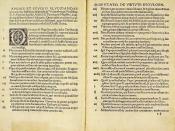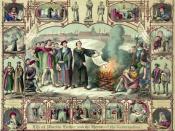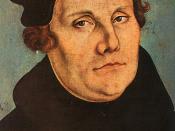Martin Luther and the Reformation
This essay is concerned with Martin Luther (1483-1546) and his concept of Christianity. Consequently, Luther was initially loyal to the papacy and after many theological conflicts, he tried to reconcile with the church. But this was a paradox not to endure because in his later years, Luther waged a continual battle with the papacy. Martin Luther, although he was not a politician, saw himself as a professor of the Holy Scriptures and a teacher of the church. Like St. Thomas, Luther believed that each person had his proper place in society and should keep it, and he used the word ''calling" to suggest that God wants a Christian to be dedicated to his vocation. He set in motion epochal changes in the culture and politics of 16th-century Europe, changes that helped shape the history not only of Europe but also of the world.
The Reformation, like the Renaissance, was born in the fold of little states.
Indeed, without them, it could not have survived. Like the humanists, the Reformers were opposed to the cloister and were thoroughly committed to life in the world. The culture roughly described as humanist in an agrarian state, and the Reformation, arose as papal vitality grew. Both movements were of emancipation, drawing their inspiration and their legitimacy from an earlier period. In their recasting of values, and their attempt to shape new views of man, the humanists and Reformers were similar, but their visions of life and of human capacity and their sources of authority were quite different.
Early Christian authority, rather than pagan classics guided the Reformers. They were less Greek and Roman than Hebrew. Although Rome wanted to silence Luther, powerful German princes, led by Elector Frederick of Saxony, Luther's benefactor, secured freedom of speech for him. While...



Great essay.
This essay helped me get a B on recent paper I had to do on this same topic. This essay was well-written and covers the Reformation really well. Great work.
7 out of 7 people found this comment useful.